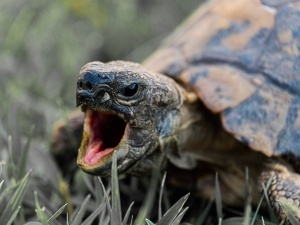
Taking care of a baby turtle is a full-time job, these little animals are more fragile than adult turtles and they need more care, if your baby tortoise is gasping then you may think that there is something wrong with it.
This article looks into why your tortoise is gasping.
Table of Contents
Baby tortoise gasping:
A change in your baby tortoise’s behavior is a sign that there is something going on with the little animal, something that you’d definitely need to check out and address
Here is why your baby tortoise is gasping:
Obstruction in the throat:
Your pet tortoise, especially your young pet tortoise, will eat almost anything, even eating things that it shouldn’t be eating.
While tortoise food like pellets will quickly go soft and go down the animal’s throat, and so will organic matter, other objects may not go down as easily.
If your baby tortoise is gasping it may have eaten something it shouldn’t have and is gasping to get the object out.
If your pet does have anything stuck in its throat then it may push its front legs towards its mouth in an effort to dislodge the object.
What to do:
Objects getting stuck in your pet’s mouth is totally normal, this happens all the time and these animals usually get objects out on their own.
Your pet will eat something, or drink something to get the object down or will gasp or push its legs toward its mouth to get the object out
You can monitor the turtle to see if it manages to get the object out, stay calm, the object will likely come out this way
If you do want to help, you can soak the reptile in some warm water for 15-30 minutes. Your pet will drink the water during the soak and this will get the object down its throat.
Avoid trying to remove the object yourself
Respiratory infection:
Another reason why your baby tortoise may be gasping may be that the animal has a respiratory infection.
This condition can be caused by a number of things including a virus, bacteria, fungus, or a parasite.
These foreign bodies may attack your pet because of poor husbandry, stress, or because it interacted with a sick tortoise
In addition to the gasping, other signs of this condition in your baby tortoise include wheezing, nasal or oral discharge, lethargy, difficulty breathing, a lack of appetite, and reduced activity altogether.
Respiratory infections can turn into pneumonia, so, not only it is important to treat your adult tortoise if it has this condition, but treating your baby tortoise is even more important because they are so much weaker.
What to do:
Taking your pet to the vet as soon as possible would be the best thing you can do for your pet. The vet will run lab tests which will quickly determine what the cause of the infection is.
The medication that your little tortoise will be given will be determined by what caused the infection. The medications that your pet will get may be antibiotics, antivirals, or something else.
While you wait to get your pet to the vet you can offer your little pet supportive care like isolating the baby animal, maintaining or even increasing the temperature and humidity in the enclosure, and making sure that the animal is eating and drinking.
If you enjoyed this article then you may also be interested in other turtle/tortoise related articles. Here are some articles that you may be interested in: Baby Tortoise Crying Noise At Night Sick, Why Is My Turtle Making Clicking Noises?, Tortoise Making Whistling Noise When Eating, Tortoise Clicking Jaw, Tortoise Swollen Neck, Tortoise Making Whistling Noise, Tortoise Gasping, Why Is My Tortoise Squeaking At Night?, Sulcata Tortoise Making Clicking Noise

